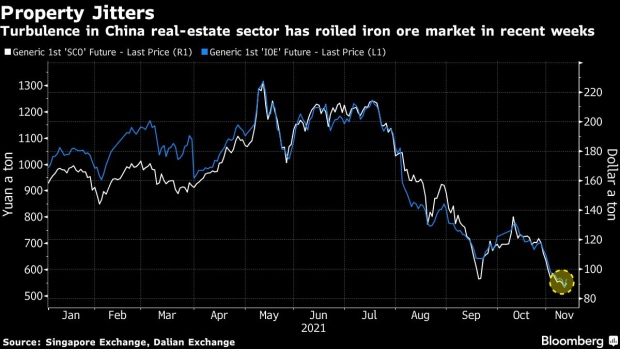Nov 11, 2021
Iron Ore Rebounds With Metals on Hopes for China Property Easing
, Bloomberg News

(Bloomberg) -- Iron ore’s rout halted as expectations build for an easing of the real-estate turmoil in China that battered metal demand, while aluminum jumped as supplies tighten.
Beijing appears to be making moves to limit the economic fallout of its drive to squeeze debt from the property sector. A series of prominent articles in state media highlighted possible measures to manage the crisis at China Evergrande Group and pursue wider measures to support the sector.
Iron ore futures jumped more than 5% in Singapore, steel futures in Shanghai spiked to their daily trading limit, while stocks and bonds of property developers also surged. Aluminum in London rose more than 3% as China continues to control energy use, with freely available stocks of the metal at the lowest levels since 2005.
Bank lending to developers rose sharply in October, and the momentum is expected to extend into November, three of the country’s top securities newspapers reported. That came after Evergrande was able to pay overdue interest on some dollar bonds, easing a deepening crisis that was souring the mood in commodities markets.
There’s “improved sentiment around the ability of China’s property developers to meet debt obligations” and some hopes that Chinese steel producers will be able to raise production soon, Atilla Widnell, managing director at Navigate Commodities said.
Strains in China’s real-estate sector, from Evergrande’s debt crisis to weaker home sales, have shaken the steel market by dampening construction activity in recent months. ArcelorMittal SA, the world’s biggest non-Chinese steelmaker, said demand in China will fall this year amid property woes.
Modest Turn
“Weak steel demand and low steel mill margins are likely to keep iron ore prices under pressure in coming weeks,” Vivek Dhar, commodities analyst at Commonwealth Bank of Australia, said in a note, adding that the bank sees downside risks to its fourth quarter outlook of $100 a ton.
Output from major Chinese steelmakers shrank nearly 20% toward the end of October, while iron ore inventories are at their highest since April 2019.
Iron ore futures settled 5.3% higher at $92.50 a ton on the Singapore Exchange. Dalian futures had closed up 6.3% while hot-rolled coil steel in Shanghai finished at its upper trading limit after gaining 5.2%.
Aluminum, which is being supported by China’s measures to control energy use and prevent pollution, rose 3.2% to settle at $2,660 a metric ton on the LME at 5:53 p.m. local time. Freely available stocks tracked by the exchange are now at the lowest level since December 2005, with a sharp drawdown over recent months suggesting demand is outpacing supply. All other main LME metals gained except zinc.
©2021 Bloomberg L.P.


